|
|
|
Sort Order |
|
|
|
Items / Page
|
|
|
|
|
|
|
| Srl | Item |
| 1 |
ID:
175109
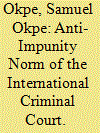

|
|
|
|
|
| Summary/Abstract |
In recent years, the position of the International Criminal Court (ICC) in Africa has become an issue of contention. Through the African Union (AU), African leaders have expressed their concern in relation to the principle of impunity and self-sovereignty of African nations. The AU asserts fiercely that the influence of the ICC is overwhelming on the African continent; therefore, African leaders clamor for an amendment to the court or even a total withdrawal. I argue that the change of relationship initiated by the AU is not only selfish but also unequivocally harmful to the tenets of justice, law and order. By way of a vast exploration of data (internet sources, official government records, print sources and online interviews), this study reiterates the importance of the anti-impunity norm of the ICC as an instrument of equity, especially when African leaders are involved.
|
|
|
|
|
|
|
|
|
|
|
|
|
|
|
|
| 2 |
ID:
168878
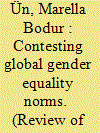

|
|
|
|
|
| Summary/Abstract |
Over the past two decades, constructivist International Relations (IR) scholars have produced substantial knowledge on the diffusion and adoption of global norms, emphasising the role of Western norm entrepreneurs in constructing and promoting new norms to passive, generally non-Western, norm takers. An emergent literature on norm dynamics unsettles this narrative of linear progress, highlighting the agency of diverse actors, including the agency of non-Western norm entrepreneurs, in normative change. This article contributes to this recent norm research by exploring the normative agency of local actors in the Turkish context, who have actively engaged in normative contestation over the meaning of gender equality. More specifically, the article reveals the crucial role of a pro-government, conservative women's organisation in subverting global gender equality norms and in promoting a local norm of ‘gender justice’ as an alternative. The article furthers research on norm contestation by analysing the discursive strategies and justifications local norm makers have adopted in the Turkish context upon encountering norms that challenged their normative beliefs and practices. Finally, the article critically engages with postsecular feminism, highlighting the agency of a religiously informed, conservative women's organisation as a non-Western norm entrepreneur.
|
|
|
|
|
|
|
|
|
|
|
|
|
|
|
|
| 3 |
ID:
156228
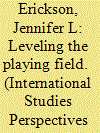

|
|
|
|
|
| Summary/Abstract |
Why do states take the lead in diffusing norms they once resisted? I address this question in the context of new humanitarian arms trade norms, culminating in the 2013 Arms Trade Treaty (ATT). Although most major arms exporting states have supported the ATT and similar initiatives, only some have chosen to invest resources in becoming leaders of these initiatives to spread new norms beyond their borders. I examine British and German arms export policies and practices to argue that states that choose leadership following costly norm adoption may do so as a means to share the costs of those norms with other international actors and reduce future adaptation costs. By delving deeper into the agency of norm diffusion, the article offers insights into powerful states’ motivations for norm leadership following costly norm adoption, the dynamics of norm diffusion, and the institutional form international norms eventually take.
|
|
|
|
|
|
|
|
|
|
|
|
|
|
|
|
| 4 |
ID:
106018


|
|
|
|
|
| Publication |
2011.
|
| Summary/Abstract |
There has been an ongoing debate about how (or through what mechanisms) global environmental norms have influenced domestic political debates that give rise to green policy choices. In particular, effective international environmental cooperation between transnational and domestic NGOs has been recognized as a key to successful environmental movements. In this regard, the central question guiding research on the politics of environmental norms is, under what condition(s) transnational cooperation among NGOs would be more likely to be sustained so as to achieve its goals. This article proposes that one of the mechanisms missing from the debate is a bottom-up approach through which transnational cooperation can be forged by the initiation of domestic NGOs. Drawing on social movement literature, it is hypothesized that domestic environmental NGOs with more resources, challenging ideologies, and more contentious modes of protest to dominant paradigms is more likely to nurture, develop, and sustain effective transnational cooperation for environmental norms. The validity of this hypothesis is demonstrated through the examination of wetland reclamation projects in Japan and Korea.
|
|
|
|
|
|
|
|
|
|
|
|
|
|
|
|
| 5 |
ID:
153507
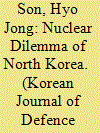

|
|
|
|
|
| Summary/Abstract |
Why does North Korea continue to insist on maintaining a nuclear program despite
its potential to be detrimental to the regime in the long term? This article argues
that North Korea’s nuclear development strategy is derived from policymakers’
cognitive systems and norms that have accumulated over the decades. This study
especially attempts to examine the mechanism behind how the normative system
shaped by North Korea’s historical environment generates and re-generates nuclear
strategy through nuclear discourse by applying the lens of Strategic Culture. It
begins with a critical assessment of previous research on the motives of a nation
or regime’s nuclear development policy and proposes the suitability of Strategic
Culture for North Korea’s case. This article then characterizes North Korea’s
Strategic Culture as a “Wartime Preferring Strategic Culture” which emphasizes
the norm of the “prioritization of military values,” “closed groupism,” and “deontic
mass mobilization.” These norms are based on the policymakers’ cognitive systems
related to the fear of regime cleavage. Consequently, North Korea’s Strategic
Culture, which is based on fear perception, influenced policy makers and drove
them to strengthen nuclear development.
|
|
|
|
|
|
|
|
|
|
|
|
|
|
|
|
| 6 |
ID:
158671
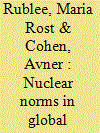

|
|
|
|
|
| Summary/Abstract |
We argue that the framework of norms has generated a progressive research agenda in the field of global nuclear politics, providing important insights that traditional realist and materialist analyses ignore or dismiss. These insights are not on the margins of nuclear politics; rather, they answer central questions about nuclear non-use, possession, and the nonproliferation regime at large. These findings are not a fluke; instead, they stem from the powerful analytical framework of norms, which provides complexes of linked propositions about actor expectations and behavior in global nuclear politics. This article examines three of those propositions: the importance of the logic of appropriateness, the role of norm contestation, and the changes brought about by norm entrepreneurs. Finally, we identify other norms-related ideas that can further illuminate the dire policy crises facing global nuclear governance, as well as specific areas of nuclear politics that would benefit from norms-related scrutiny.
|
|
|
|
|
|
|
|
|
|
|
|
|
|
|
|
| 7 |
ID:
107163
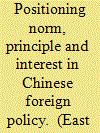

|
|
|
|
|
| Publication |
2011.
|
| Summary/Abstract |
There are different driving forces behind Chinese foreign policy decision-making. Norms, principles, and interests and the subtle combinations of them, I argue in this paper, are the major driving forces on the input side, while the domestic situation of a specific country and international pressure undercut China's policy deliberations. By contrast, the form of government of a specific country under discussion is not an important variable. In this paper, I use China's policy toward Myanmar as a case study. The findings prove that the integration of norms, principle and practical interests has formed the powerful impetus that drives China's policies toward Myanmar. Among these factors, the interests China has identified in general and stability on its "doorstep" in particular play a dominant role, while the norm of human security and the principle of non-interference are embedded in its policy deliberations.
|
|
|
|
|
|
|
|
|
|
|
|
|
|
|
|
| 8 |
ID:
107181


|
|
|
|
|
| Publication |
2011.
|
| Summary/Abstract |
There are different driving forces behind Chinese foreign policy decision-making. Norms, principles, and interests and the subtle combinations of them, I argue in this paper, are the major driving forces on the input side, while the domestic situation of a specific country and international pressure undercut China's policy deliberations. By contrast, the form of government of a specific country under discussion is not an important variable. In this paper, I use China's policy toward Myanmar as a case study. The findings prove that the integration of norms, principle and practical interests has formed the powerful impetus that drives China's policies toward Myanmar. Among these factors, the interests China has identified in general and stability on its "doorstep" in particular play a dominant role, while the norm of human security and the principle of non-interference are embedded in its policy deliberations.
|
|
|
|
|
|
|
|
|
|
|
|
|
|
|
|
|
|
|
|
|